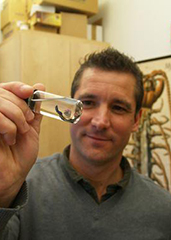Enhancing student learning through field experience
March 11, 2019
This post is republished from Into Practice, a biweekly communication of Harvard’s Office of the Vice Provost for Advances in Learning
 Gonzalo Giribet, Professor of Organismic and Evolutionary Biology, takes students in his course Biology and Evolution of Invertebrate Animals (co-taught this semester with Professor Cassandra Extavour) to Panama to do fieldwork during spring break to help them see how invertebrate animals “are assembled in nature,” and how “organisms are integrated into systems.” Students incur no costs for the trip thanks to funding from the Museum of Comparative Zoology.
Gonzalo Giribet, Professor of Organismic and Evolutionary Biology, takes students in his course Biology and Evolution of Invertebrate Animals (co-taught this semester with Professor Cassandra Extavour) to Panama to do fieldwork during spring break to help them see how invertebrate animals “are assembled in nature,” and how “organisms are integrated into systems.” Students incur no costs for the trip thanks to funding from the Museum of Comparative Zoology.
The benefits: “Being in nature in the wild,” allows students to see the phenomena they’ve studied in their true context, rather than an academic vacuum; they gain an “accurate perception of reality” that changes their preconceptions—and sometimes their career paths—substantially. Moreover, students and instructors travel, work, and eat side by side throughout the excursion, which enhances the rapport, trust, and collaboration needed for this kind of learning.
The challenges: Integrating field study into a residential course poses significant logistical challenges. It can only happen during spring break so that students don’t miss their other classes. This constrains when the course can be offered and also means that instructors work over the break. In addition, the teaching team needs to offer extra guidance to students (and their families) who have no international travel experience.
Takeaways and best practices
- Scaffold the learning. Giribet prepares students for the field experience with two additional stages. Lectures provide a foundation: “I tell them, ‘you’re going to learn a lot of new terminology, so you’re really going to have to study the old-fashioned way, memorizing names, organ systems, and animals—all the boring components of classical zoology.’” Weekly labs enable students to see, touch and dissect specimens, observing “how things move” and bringing them “from lecture to life.”
- Encourage specialization. Students choose a particular invertebrate to focus on throughout the course. They analyze particular examples of it during labs and in the field and have a niche to guide their searches and study. The specimens they collect inherently interest students and they become knowledgeable about something they really care about—all of which increases ownership of learning.
- Foster respect and well-being. With students and instructors spending so much time together in the field, Giribet is adamant about the importance of respect for each other and attending to health and safety. Because students “see how much work it takes to organize a trip like this,” he finds that they are cooperative and invested in making it work well. Three to six teaching fellows are essential to Giribet’s teaching team, since it’s “good to have more eyes” (with a 1:4 ratio at most) while diving and exploring underwater.
Bottom line: Being thoughtful in structuring his students’ intensive study of marine diversity allows Giribet to build a strong learning community that brings deep value to all participants.

